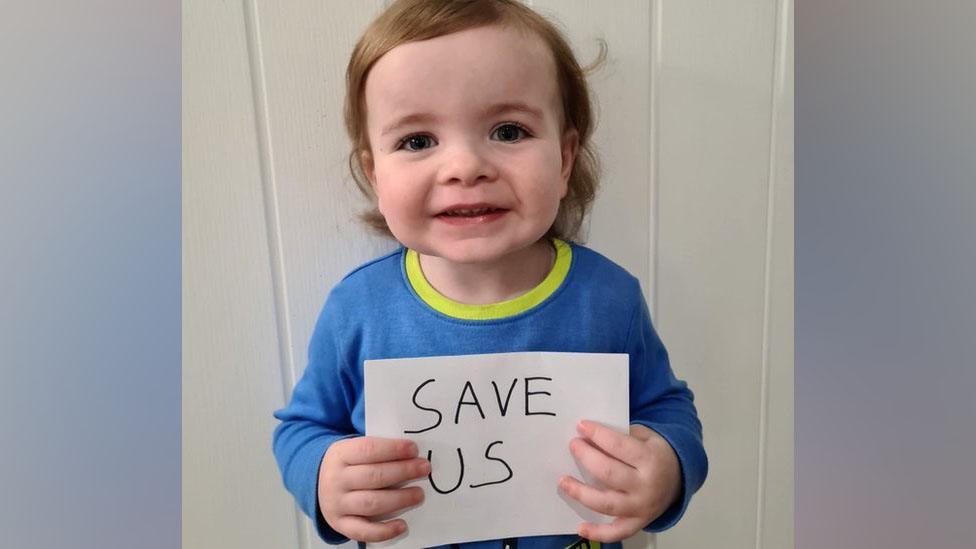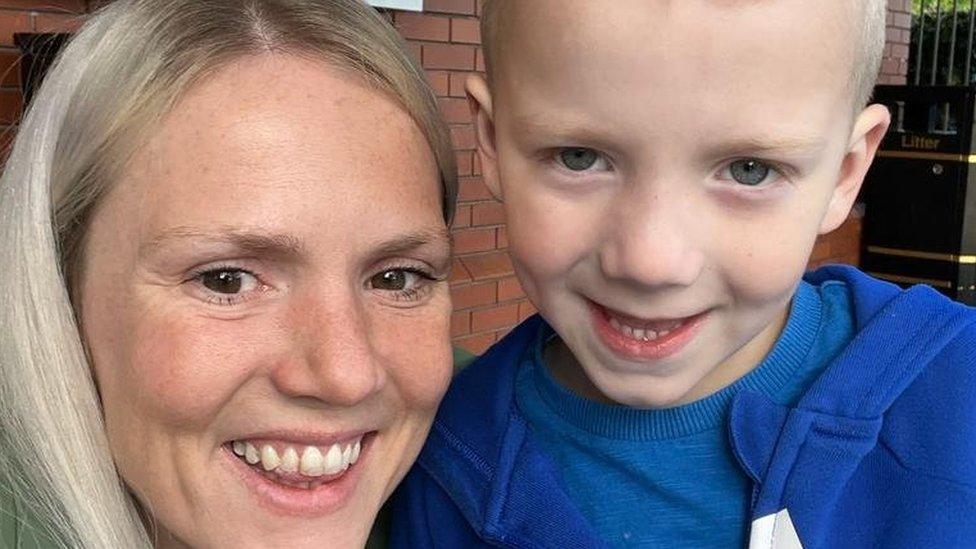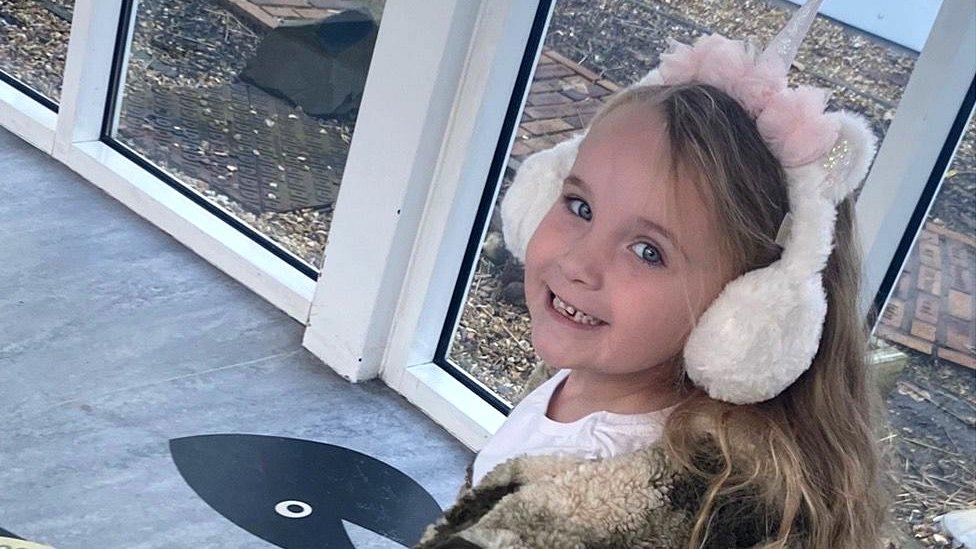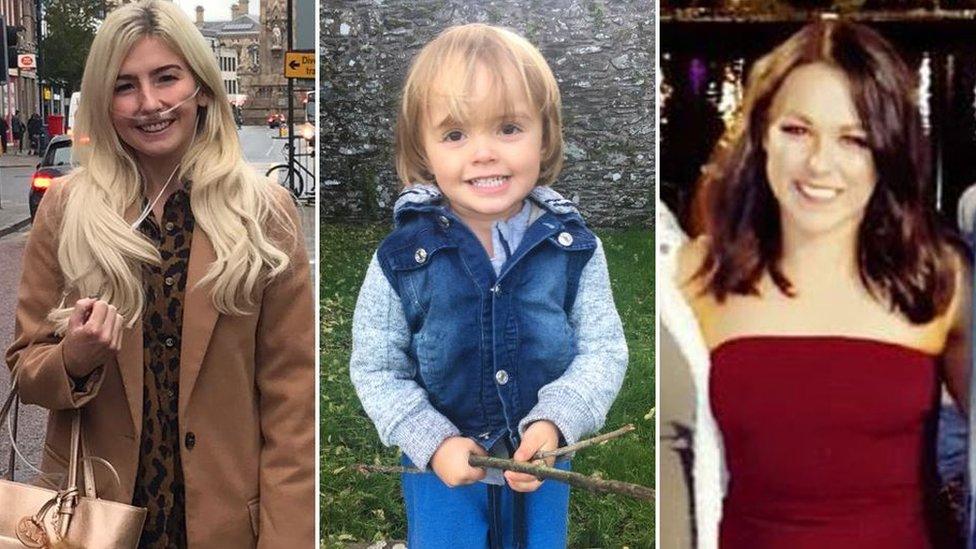Cystic fibrosis: Concern over access to Kaftrio, Orkambi and Symkevi
- Published

George Colvin's mum Alice believed Kaftrio would make a difference to his condition
Parents of Northern Ireland children with cystic fibrosis (CF) say they are worried by a recommendation to remove access to three drugs to treat it.
Draft guidance from the UK's healthcare advice body says that Orkambi, Symkevi and Kaftrio are too expensive to be recommended for use on the NHS.
Alice Colvin, whose son George, two, has CF, hoped Kaftrio would help him.
"You think your child is going to get this amazing drug and then it's snatched away from you," she said.
"We've always heard about this Kaftrio and held on hope. It's brought us right back to the diagnosis, through those emotions."
The draft guidance was provided by the National Institute for Health and Care Excellence (Nice), which said it was "evaluating the cost-effectiveness" of the drugs "to ensure that taxpayers continue to get value for money".
A final decision on the treatments will be made after a four-week consultation.
Any change would not affect those who already take Kaftrio or Symkevi, which are currently recommended for patients aged six and over, or Orkambi, which can be used at age one and over.
'It's heart-breaking'
Laura McGlone, whose four-year-old son Shea has CF, described the potential change as "gut-wrenching".
The family went on holiday to Spain this year and were worried Shea would pick up an infection from the swimming pool.
"My husband said: 'Next year he'll be on Kaftrio and we can let him in the pool then,'" said Ms McGlone.
"That's the hope we had to make his life as normal as possible. It's heart-breaking to tell him: 'No.'"
Terri-Leigh Watson, whose son Jace has CF, said that removing access to the drugs because it is too expensive would be "putting a cost on our child's life".

Terri-Leigh Watson says that the drugs could be the difference between her son Jace outliving her and not
She hoped that her son, who is five and half, would be starting on Kaftrio as soon as he turns six, but said that is now in doubt depending on the recommendations from Nice.
"This shouldn't be like a death sentence hanging over him like it was before," she said.
Ms Watson said Kaftrio is a "wonder drug" that is "changing people's lives".
"For the first time ever they believe that cystic fibrosis patients are going to outlive their parents, and that's crazy, that's all I want is for my child to outgrow me," she added.

What is cystic fibrosis?
Cystic fibrosis is an inherited condition that causes sticky mucus to build up in the lungs and digestive system.
It can cause lung infections and problems with digesting food.
Symptoms usually start in early childhood and vary for each individual but the condition gradually gets worse over time, with the lungs and digestive system becoming increasingly damaged.
There is no cure for the condition but a range of treatments can help control symptoms and reduce complications.
Currently, about half of people with cystic fibrosis will live past the age of 40. Children born with the condition nowadays are likely to live longer than this.
Source: NHS, external

North Antrim MP Ian Paisley raised the issue in the House of Commons on Thursday.
He said that "such a decision robs suffering children and their parents of the hope to life" and he asked if the four-week consultation period was adequate.
Commons Leader Penny Mordaunt acknowledged that the evaluation "will be a concern to everyone who has this condition or their carers and families".
She said: "There is a very clear process to go through to ensure that drugs that are available and are approved by Nice are cost effective as well as clinically effective".
Ms Mordaunt added that even if a drug is not Nice-approved "patients under certain circumstances can still have access to it if it can be shown it would disproportionately benefit that individual".
'Need to find a solution'
According to Ms Colvin, CF affects George's bowel, which has made toilet training difficult, but she had hoped Kaftrio would make a difference.
When George gets viruses he has to increase his use of nebulizers, go on antibiotics, steroids or inhalers and increase the amount of physiotherapy he does.
Ms Colvin said the family was more mindful of the "cleanliness of the house" and potential bacteria in "leaves and muddy puddles".
Ms McGlone said her son Shea was "very well" but they work hard to achieve that through physiotherapy and medication.
"In the winter when it's colder he has an increase in nebulizer treatment and physio so it's a rigorous routine," she said.

A final decision on the treatments will be reached after a four-week consultation
Cystic Fibrosis Trust chief executive David Ramsden said Nice's initial recommendation was "disappointing news".
He emphasised the need "to find a solution to make these treatments available for all those who could potentially benefit".
"We must never return to a situation where people with CF die far too young, knowing there's a treatment that could change that," he added.
Stormont's Department of Health emphasised that "the draft guidance is not Nice's final guidance".
"Comments received during this consultation will be considered by Nice at a further appraisal meeting before the next draft guidance is issued," it said.
Health service patients were given access to the drugs Orkambi and Symkevi in 2019 and Kaftrio in 2020.
The Nice appraisal process started at the end of 2022, with the draft guidance open for consultation until 24 November.
Nice expects to publish final guidance in mid-March 2024.
- Published13 January 2022

- Published9 December 2019

- Published29 October 2019
